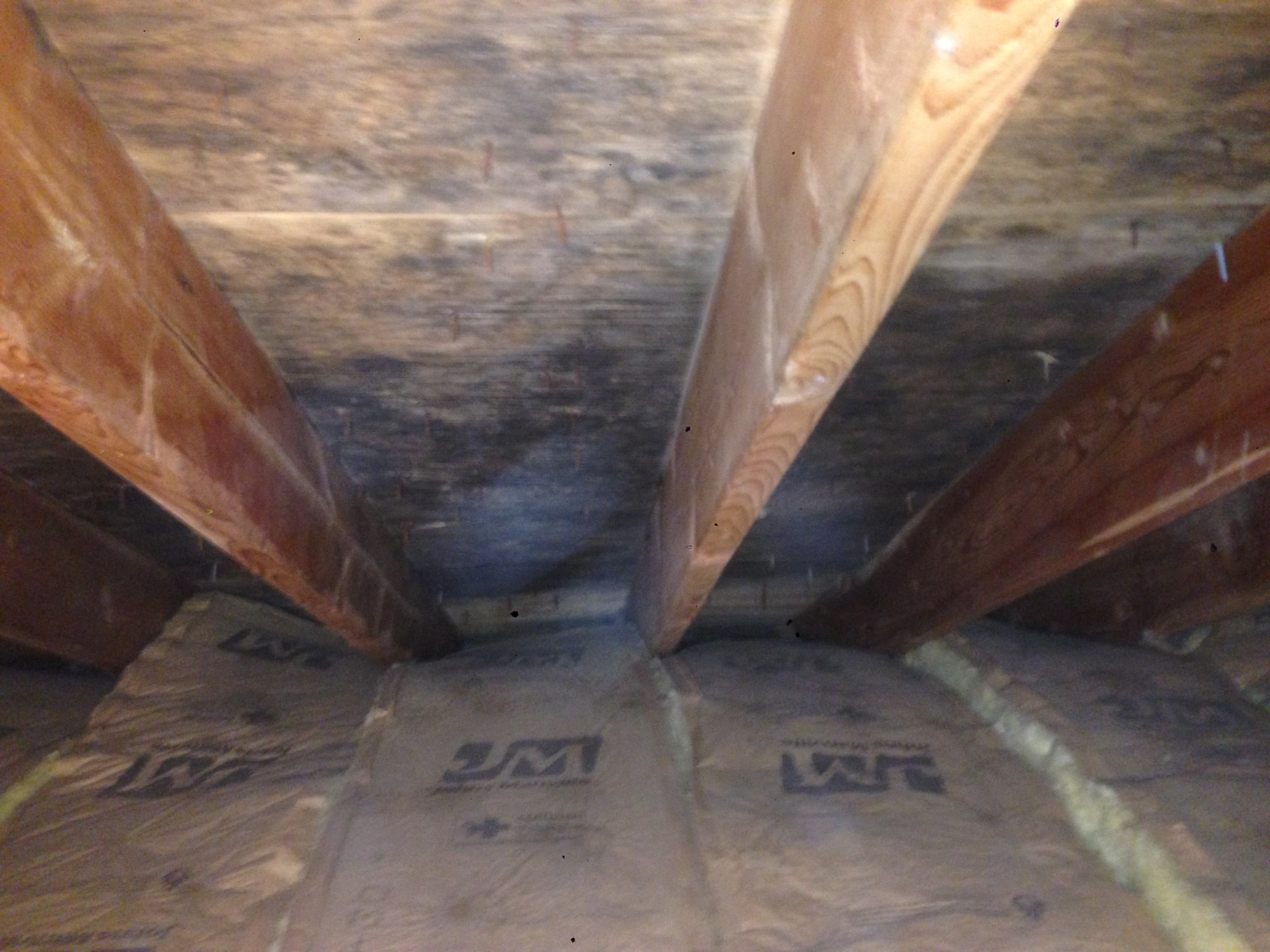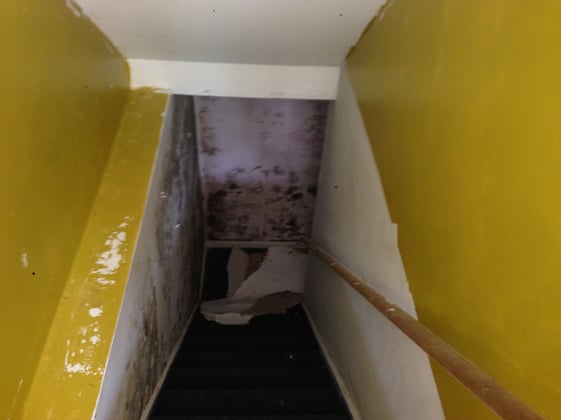After almost 20 years of providing environmnetal solutions, we have provided a summary of the molst commonly asked mold related questions. What to know about mold, toxic mold, mold remediation and who to hire to perform mold remediation? Read our commonly asked mold questions.
 What is Mold?
What is Mold?
Mold is a fungi that can be found both indoors and outdoors. Mold is natural to our environment; some level of Mold is present at all times. Outdoor Mold can be found in shady, damp areas such as where leaves lay or where vegetation is decomposing. Indoor Mold is found when moisture levels rise above 60; for example, Attics, Crawl Spaces, Basements and Showers (bathrooms).
How many types of Mold are there?
There is no general consensus as to how many types of Mold there are in the world. Estimates range from tens of thousands to over three hundred thousand or more.
What are some of the common indoor Molds?
- Cladosporium
- Penicillium
- Alternaria
- Aspergillus
How do Molds affect people?
In 2009, the World Health Organization issued additional guidance, the WHO Guidelines for Indoor Air Quality: Dampness and Mold [PDF - 2.52 MB]. Studies have suggested a potential link of early Mold exposure in children to development of asthma in, particularly among children who may be genetically susceptible to asthma development, and that selected interventions that improve housing conditions can reduce morbidity from asthma and respiratory allergies. Bottom line more research is needed, but evidence to date correlates to health related concern in Moldy environmental as compared to living spaces that lack Mold growth. Molds grow best in warm, damp (wet), and humid conditions. When Mold grows it can off-gas and produce the smell of musty odor that is so commonly associated with Mold. When conditions are right (humidity below 55 and temperature below 70 degrees), Molds will go dormant, like a lawn in winter. When temperatures rise and moisture levels increase Molds will grow again, which is when you are more likely to smell the musty odor.
I smell a musty odor but don’t see any Mold?
If a musty odor is present, which is not typical for the living space, quite simply you have something that is off-gassing causing the odor. You must ask yourself a few questions.
I see Mold but I do not smell a musty odor, why? If I don’t smell Mold is it not Mold?
In 2004, the Institute of Medicine (IOM) found evidence to link indoor exposure to Mold with upper respiratory tract symptoms, cough, and wheeze in otherwise healthy people; with asthma symptoms in people with asthma; and with hypersensitivity pneumonitis in individuals susceptible to that immune-mediated condition. The IOM also found limited or suggestive evidence linking indoor Mold exposure and respiratory illness in otherwise healthy children.
- Has anything changed in the space?
- Has anything new been brought into the space such as books, boxes or old possessions that maybe giving off an odor.
- New carpet, paint, furniture?
You see where this is going, if nothing has been added then something that is and has been present is off-gassing and if the odor is truly musty, then a moisture issue is present and fueling Mold growth. In the industry we call this Hidden Mold and you should hire a professional to look for Mold.
Can Mold be killed by cold weather?
Mold spores can survive extreme environmental conditions, such as dry and freezing conditions. Like grass they go dormant and will become active again when conditions improve.
I am looking to hire a firm to remediate Mold, what licensing should I look for?
If your site is in New Jersey, Pennsylvania or Delaware, there is no licensing or state certification. Unlike tank removal which requires companies to be certified, Mold remediation is not a service where a license is required.
Should I be concerned that the Mold Company is not certified?
Yes and no. Yes, you should be concerned as it is difficult to ascertain if the company is qualified or competent to remediate Mold when a licensing program does not exist. There are things to look for when evaluating Mold fits. One did you find them through advertising? Surveys have shown that referral is a more solid form of evaluation as opposed to pay per click advertising. Next, google the company, is it a PO Box, do they work out of a house in a residential area, if so tread with caution, these firms need personnel and equipment to perform the work and a home based business typically means they subcontract the services. Third, do they provide any other environmental services? Carpet cleaning and termite services are not what is typically associated with environmental services, these firms maybe doing Mold as a sideline. Full-service companies would also perform other remediation services such as tank removal, soil and water remediation and environmental audits. These types of firms have no doubt encountered Mold in a variety of commercial and residential settings and are more likely to have the expertise. As a general point of reference New Jersey, Pennsylvania & Delaware require licensing to perform these tasks so you can be assured there are some core competencies at the firm.
Why should I not be concerned about Mold licensing?
Well to be fair, only New York State has licensing requirement for Mold inspection and remediation and that started on January 1, 2016. So it is hard to be licensed in a state if the state does not offer it. I would circle back to the above answer for a more thorough explanation as to why you should be concerned.
I obtained two quotes to remediate the Mold and the prices are wide spread, why are costs so variable?
We have found that companies that are home based or “Mold only” firms, swing high on costs as their workload is so variable and to survive they have to charge more when work is not abundant. These firms also suffer from a diversity of services, so if jobs are not coming in for Mold related work, they have no other sources of revenue. Remember every property needs plumbing, roofing and painting, NOT every site will require Mold remediation, so if that is all a company offers too many eggs may be in one basket. In Curren’s 20 years of business, we have seen the opening and closing of franchised operations with too high of an overhead same goes for small, home-based entities closing up shop.

A company tested for mold and told me I have Toxic Mold and need to remediate the mold immediately. Is there such as thing as Toxic Mold? I feel like the mold company is trying to scare me, no one is getting sick from the mold.
Great questions and you should be wary of anything else the mold company says. According to the Centers for Disease Control & Prevention (CDC), and this is directly from their website http://www.cdc.gov/mold/stachy.htm
The term "toxic mold" is not accurate. While certain molds are toxigenic, meaning they can produce toxins (specifically mycotoxins), the molds themselves are not toxic, or poisonous. Hazards presented by molds that may produce mycotoxins should be considered the same as other common molds, which can grow in your house.
Who is the CDC? Why should I believe the CDC, when they say there is no toxic mold?
From the CDC web site: The CDC works 24/7(http://www.cdc.gov/24-7/index.html) to protect America from health, safety and security threats, both foreign and in the U.S. Whether diseases start at home or abroad, are chronic or acute, curable or preventable, human error or deliberate attack, CDC fights disease and supports communities and citizens to do the same.
Unfortunately, Mold is highly unregulated and misinformation is being presented by mold companies (private non-government web sites) that only cares and confuses consumers.
I had Mold remediation performed, how do I prevent Mold from returning?
Take away the food source and environment and Mold growth can be prevented. Keep humidity levels as low as you can—no higher than 50%—all day long. An air conditioner in summer and or dehumidifier YEAR ROUND will help you keep the level low. Humidity levels change over the course of a day with changes in the moisture in the air and the air temperature, so 24/7 dehumidification is recommended. Dehumidifiers that are able to operate autonomously, meaning units that have a drain house connected to an outfall such as a sink or sump, so human interaction is not required to empty the water tank is best. Exhaust fans that actually suck air in humid environments such as bathrooms are needed and MUST be used when humidity increases. Bottom line we find Mold in bathrooms where exhaust gas fans are not present, are not used or lack sufficient power to exhaust humid air. Take our test, turn on the fan and place a paper towel on the fan, if the fan cannot hold the towel in place, your fan sucks and not the good kind (replace the fan).
- Attics should able passive and active ventilation
- Crawl spaces should be dry with vapor barriers.
- Soil should have a positive slope around the entire house so water flows away not toward the foundation.
- All roof leaders should be extended 5’ to 10’ away from the building foundation.
- Do not carpet bathrooms and basements.
- Any water entry, flooding, eat, must be dried out within 48 hours to prevent Mold growth.
I saw Mold and hired a company to inspect and they confirmed it was Mold. They were quick to give me a cost to remediate (read expensive Mold remediation) but said little regarding why the Mold was present.I found Mold growing in my home, how do I test the Mold?
The EPA and CDC do not recommend sampling for Molds. Since the susceptibility of individuals can vary greatly, the type is not important. If you are susceptible to Mold and if it is seen or smelled, there is a potential health risk; therefore, no matter what type of Mold is present, you should arrange for its removal.
Mold inspection without evaluation as to what caused the Mold is a concern. Mold inspections should provide an opinion as to why the Mold was present, i.e., what caused it and what to do to prevent growth in the future. We have seen Mold grow back after remediation due to the fact that the moisture problem was not addressed – controls to stop the moisture were not established so of course Mold can grow back.

